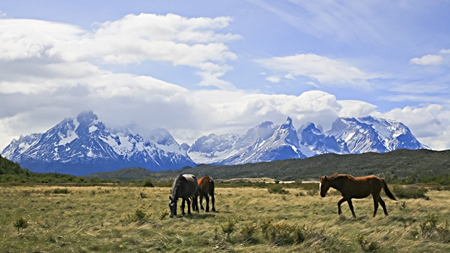Some wine writers have claimed that Chile is a “winegrower’s paradise” because of the natural geographical features, the rich soils and the climate. The main wine-growing area is Chile’s five-hundred mile long Central Valley, largely unknown to the outside world until the middle of the fifteenth century. The Andes are never very far away, and neither is the sea.
According to their website, the Lazo brand is evidently inspired not only by the landscapes of Chilean Patagonia but also by the gauchos (Patagonian cowboys) who live there.
 Home of the gauchos: Torres del Paine National Park, Patagonia. (Photo: Diego Delso)
Home of the gauchos: Torres del Paine National Park, Patagonia. (Photo: Diego Delso)
Lazo Sauvignon Blanc 2011 (white) Chile (Bt. 420 @ Foodland)
Your first impression of this pale straw-coloured wine might be delicate flowers and gooseberries. The colour has hints of green too. But I think there’s the also smell of the sea air, mineral notes and a faint tang of lemon. It has a pleasing soft texture, a light body and you’ll probably pick up the gooseberries and the faint mineral tastes on the palate as well. Of course, the wine is very dry and it has an unusually long finish too. The fruit flavours persist right through the finish and as always, this is a sign of a really well-made wine. There’s a good balance of fruit and acidity and the wine is quite tangy and refreshing. It’s a good deal tamer than some its Sauvignon Blanc cousins from New Zealand and has an attractive dash of youthful zest, just like I used to have.
The wine was fermented in stainless steel tanks at fairly low temperatures for eighteen days, to bring out the characteristic aroma and taste. The typical mineral quality is most attractive and at just 12% alcohol content, I think this wine would make an excellent apéritif. It would be terrific with many dishes; smoked fish, seafood, pasta or white meats. It would be good with many Thai and Chinese dishes too for they always seem to go well with light, dry and tangy whites such as this one. You could also try it with high-fat cheeses like Brie, Camembert or any of their derivatives. I know many people enjoy red wine with cheese, but light zesty whites are also excellent partners because they create a satisfying contrast to the texture of the cheese. By the way, don’t drink it with curries, because they tend to make Sauvignons taste strangely metallic.
Lazo Merlot 2011 (red) Chile (Bt. 420 @ Foodland)
At a recent and rather up-market tasting, I was anxious to try the Merlot made by a comparatively small Australian “artisan” winery. It turned out to be a text-book Merlot with an evocative earthy aroma and reminders of herbs and red berries. The elemental earthy quality came through on the taste too, with a kind of woodland bramble flavour and dark red berries. This was indeed a wine with something interesting to say. Now, I mention all this because this rather delicate, dark ruby wine from Lazo has that same characteristic earthiness on the aroma. There are also fresh dark fruits, blackberry, blueberry, and spicy herbs.
The rather complex aroma smells like that of a much more expensive wine, so please do take the trouble to give this a good nosing. With a bit of persistence, you might also detect fresh mint, cherries and aniseed. There’s even a hint of fresh tobacco – that slightly moist stuff than comes in metal tins. Incidentally, you can sometimes detect fresh tobacco in wines made from Cabernet Sauvignon, Sangiovese or Tempranillo. I thought I picked up a faint hint of coffee too.
The wine was fermented in stainless steel tanks and has a voluptuously soft mouth-feel with a silky texture. There are plenty of soft, red plums and berries on the palate giving a hint of sweetness. But only a hint, for the wine is as dry as they come with excellent balance and a most pleasing framework of firm but supple tannins. There’s an alcohol content of 13.5% and a good rounded fruity finish too. After 20-30 minutes of air contact you’ll find that the wine opens up tremendously. It’s a real charmer and a splendid example of what a Merlot can do – given the right opportunity. It would work well with pasta, cheese or even white meat.
By the way, the word “Lazo” in case you had forgotten (or like me, never knew) means “lasso” and according to the company’s website, is evidently something a well-dressed gaucho wouldn’t be seen without. But not being acquainted with very many Patagonian cowboys, I shall have to take their word for it.




